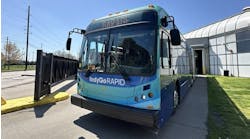Yesterday marked a national day of action "Don't X Out Public Transit" as public transit riders and advocates from across the country join together to highlight the severe effects a drastic cut to federal transit funding would have on public transit riders, their communities and jobs. An estimated, 620,000 jobs will be lost if the proposed federal funding cuts becomes law.
Despite the recent six-month extension of the surface transportation authorization bill, which will authorize public transportation funding at current levels until March 2012, the House of Representatives has proposed to cut more than one-third of federal funding for public transportation.
Yesterday's events, coupled with a new survey released by the American Public Transportation Association (APTA) highlight the dire consequences of proposed federal funding cuts on public transportation riders and systems around the country.
The survey shows that safe and reliable public transportation is at risk. If these cuts are implemented, public transit riders can expect service cutbacks, service delays and overcrowding, as systems will be forced to reduce service, lay-off workers and forego maintenance projects and curtail critical service improvements. The analysis estimates that over the six-year authorization period, 620,000 private and public sector jobs would be lost and $17.2 billion in transportation projects would be foregone.
"A one-third cut in public transit dollars will be catastrophic on many fronts — it will prevent people from getting to their jobs, schools and doctors, it will hit Americans' pocketbooks directly due to fare increases, it will eliminate thousands of jobs, it will lead to delays and overcrowding and it will postpone needed repairs in many systems," said John Robert Smith, co-chair of Transportation for America, president and CEO of Reconnecting America. "In this critical time in our nation's economy with unemployment at record levels, the federal government needs to maintain transit funding at current levels. Cuts to public transportation will only be further detrimental to an already weakened economy."
"Don't X Out Public Transit Day" is the combined effort of Amalgamated Transit Union (ATU), the American Public Transportation Association (APTA), the National Alliance of Public Transit Advocates (NAPTA), Reconnecting America, Transportation for America (T4), the Transportation Equity Network, Transport Workers Union (TWU) and transit systems and advocates across the country. The rallies and events throughout the country show the need for more investment in public transit, not less.
"Today's demonstrations reflect the frustration and anxiety felt by regular people facing the loss of the transportation they rely on every day," said Larry Hanley, president of the Amalgamated Transit Union. "It is disingenuous for public officials to claim they are against raising taxes while they are raising transit fares all over the country. At the very same time they are cutting bus and train service."
"We are making the traveling public, and transit users aware that without proper funding bus services will be dramatically cut preventing workers, or those with no other available transportation from getting to work," said James C. Little international president, Transport Workers Union of America, AFL-CIO. "Instead of cutting service we should be building our transportation infrastructure, and embrace clean, efficient transportation technology."
Public transit systems from around the country provided specific examples how the cuts would impact their operations in a variety of areas, including frequency and capacity of passenger service, maintenance and repairs programs, security enhancements, facility improvements, route expansions and vehicle purchases.
One example comes from the San Diego Metropolitan Transit System, which reported that "this proposed 30 percent cut in funding would cause an approximate $7 million reduction in service, which equals almost 1 million revenue miles annually, affecting three million passengers. This would cause a loss of approximately 50 jobs within our agency. This would also limit the ability of passengers to get to and from their jobs."
In the Centre Area Transportation Authority at State College, in Pennsylvania they report the following:, "A 30 percent cut in federal funding would mean that we would have to cut up to five of our 17 community routes. Our funding situation is already so precarious that our 'neighborhood' routes only run four or five trips a day, Monday through Friday, so any further cutbacks would mean elimination of all service on these routes."
Additionally, the cuts would have a significant ripple effect into the private sector, as APTA estimates that 12,002 fewer buses, 6,113 fewer vans and small vehicles, and 2,268 fewer rail vehicles would be made in America over the six year authorization period.
"As this survey shows, the nation's public transportation systems simply cannot sustain the significant hit to funding that Congress has proposed," said William Millar, president of the APTA. "We are concerned about the outlook for public transportation funding and jobs. This is why public transit advocates and riders have joined together to tell Congress that America needs more public transportation investment, not less."
The "Don't X Out Public Transit" day kicked off on September 20th with a series of rallies in communities across the country, from Birmingham to Chicago to Los Angeles. More information about the campaign can be found at www.supporttransit.org. APTA's survey can be found at http://www.apta.com/resources/reportsandpublications/Documents/APTA-Impact-House-Cuts-2011.pdf.


